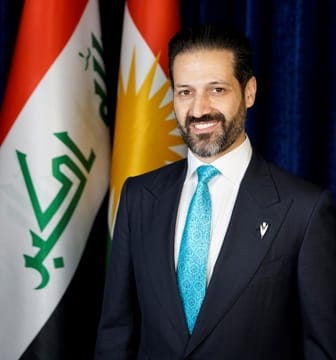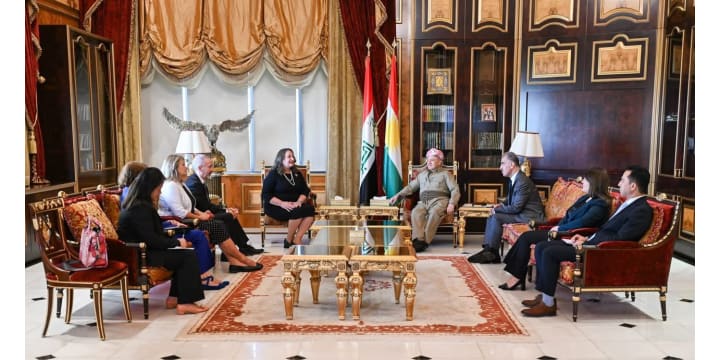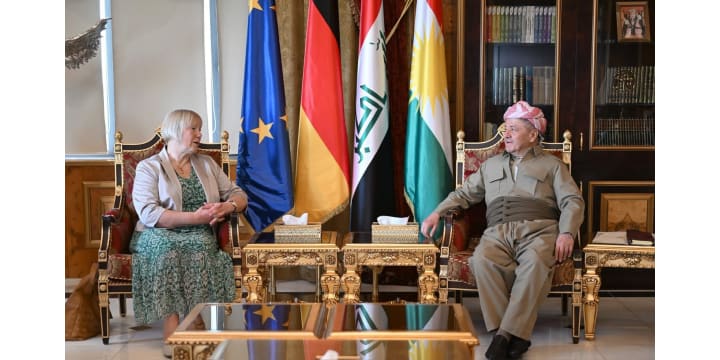
Deputy Prime Minister Qubad Talabani calls for new state oil company in Iraq and state that Kurdistan’s Share from Iraqi Budget Only 5%, Unpaid: DPM
Deputy prime minister of the Kurdistan Region Qubad Talabani on Friday called for the establishment of a new state oil company with Kurds at the helm.
“We hope to build a new oil and finance relationship with the central government, and we have faith that this will be achieved step by step, until we reach the establishment of a new SOMO company in which there are Kurdish members on the Board of Directors,” Talabani told Iraqi National News Center, referring to the State Organization for Marketing of Oil (SOMO).
SOMO, based in Baghdad, is a state-owned company responsible for the exporting and marketing of Iraqi oil. Rudaw English was unable to reach officials able to comment on the present state of leadership in the company.
“However, we are still at the beginning and more work needs to be done to increase trust between the two parties,” added the deputy PM.
The control of oil revenue has long been a thorny issue between Erbil and Baghdad. The KRG has operated an independent oil and gas sector since 2006 and later began exporting its oil to the international market via a pipeline through Turkey in 2013.
Years of tensions over the independent oil sales came to a head in 2014 when then-PM Maliki suspended the Kurdistan Region’s share of the federal budget – leaving hundreds of thousands of public sector employees unpaid for months.
In December 2019, Baghdad agreed to send Erbil a 12.67 percent share of the federal budget in exchange for 250,000 barrels of oil per day. However, neither side fully abided by the agreement, and the federal money was frozen again.
Despite scores of meetings between Erbil and Baghdad over the last year, both governments have failed to reach a concrete deal to end the long-lasting issue.
KRG delegations, mostly led by Talabani, have made several visits to Baghdad to return to finalize negotiations with Iraqi political parties represented in the parliament, as well as its financial committee, after not reaching a final agreement in their visit last month.
Their last visit was on Sunday, but they returned to Kurdistan on Wednesday without coming to a fruitful end.
Iraq’s Council of Ministers approved the 2021 budget bill on December 21, 2020. Parliament has met twice to discuss the bill, but has yet to pass it.
Deputy Prime Minister also stated that the share of the Kurdistan Region from the Iraqi national budget is a 5% underestimated share which was not paid between 2014 and 2018, said Kurdistan Region Deputy Prime Minister Qubad Talabani.
Erbil and Baghdad are in the middle of extensive budgetary negotiations now after many years of piled disputes and Iraq’s reluctance to reach a viable solution. Talabani is now leading a high-level delegation in Baghdad in pursuit of a solution with the federal government.
The Kurdish deputy prime minister said during an interview with Iraq’s national news service on Friday that the budgets foreclosed of Kurdistan are just missing without being spent for services in other parts of Iraq.
“If that was spent on investment projects in Basra or Dhi Qar provinces, we would have been pleased. But the budget is missing with no one having the knowledge of where it has gone,” Talabani explained.
He reminded that Erbil and Baghdad had made several agreements which were unilaterally abandoned by the latter, the last of which was made in August 2020 and Baghdad adhered to for only two months.
According to the agreement in August 2020, Erbil was given the right to hold its oil and non-oil incomes while receiving IQD320 billion.
“Where did this budget go? Was it spent for Baghdad or Basra or Salahaddin?” Talabani asked to emphasize that depriving Kurdistan from its financial entitlements does not mean prosperity for other parts of Iraq.
The Kurdish official reaffirmed that Erbil is committed to its obligations regarding the submission of 250,000 barrels of oil per day and the non-oil revenues based on the Constitution of Iraq. But in return, he said, Erbil expects its rights.
Concerning Erbil’s rejection of submitting all its oil to Iraq’s State Organization for Marketing of Oil (SOMO), Talabani noted that the Kurdistan Regional Government (KRG) heavily depends on oil revenues for its different sorts of expenditure, “if we lose this sole source of revenue, then there will be no guarantee for expenditures and we won’t be able to pay back our debts.”
According to Talabani, the KRG has 751,000 employees on its payroll, from which only 683,000 are recorded in Iraq’s ministry of finance. He said the submission of the entire oil industry to the Iraqi federal government will put the fate of the 70,000 employees at stake.
Kurdistan hopes Erbil and Baghdad could restructure the cooperation in the field of oil, the Kurdish official pointed out, saying that a new SOMO company which has Kurdish representatives in its administration could help build better confidence and trust.
Commenting on Iraqi oil minister’s remarks about Kurdistan’s oil industry, Talabani said bounding the Kurdistan Region’s oil to one sole administration under the Iraqi government, “is a demand against the Constitution.”
Concluding the interview, the KRG deputy prime minister urged all sides in the ongoing negotiations to avoid sentimental remarks for the sake of the elections, and instead work for a logical solution to the prolonged issues.

